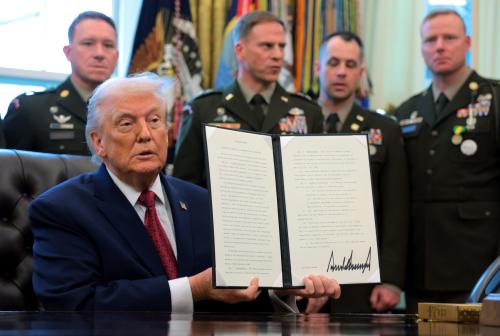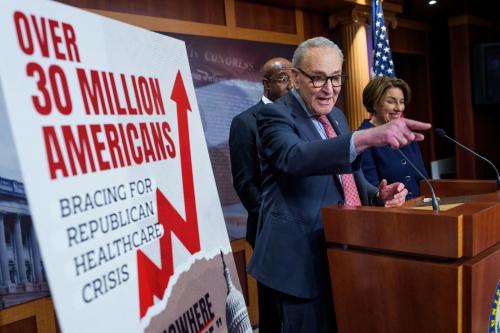Whether the Republican nominee is Jeb Bush or Scott Walker or Marco Rubio or someone else, the GOP will endorse a major tax cut. This was not always true. In the 1950s and 1960s, Republicans like Dwight Eisenhower and Barry Goldwater prioritized balancing the federal budget and expressed skepticism about broad tax cuts, at least without accompanying spending reductions. But since the late 1970s, deep “supply-side” tax cuts have become the party orthodoxy. No matter the economic context or the lack of personal enthusiasm of the candidate, the GOP will back slashing marginal rates.
Republican candidates are still consulting with supply-side guru Arthur Laffer. Scott Walker met with a group of high-level supply-siders in New York, in a meeting that mostly made news for Rudy Giuliani’s questioning whether Barack Obama loved America. But there are other voices among Republican candidates. While Jeb Bush has sworn his supply-side bona fides, Grover Norquist seems annoyed that he hasn’t signed an anti-tax pledge. Marco Rubio has co-sponsored a tax plan that emphasizes a large child tax credit and cuts the corporate rate, but that proposal might increase rates for some upper-middle-class individuals. All of the Republican candidates will support cutting taxes. Perhaps the Club for Growth or some big donors will support the more supply-side-minded contenders, but the differences will be small. Why should we care? And more importantly, does the public care?
In the general election, the Republican nominee will talk more about taxes than will the Democrats, because it is an issue that the GOP “owns.” But relatively few voters make their decisions based on issues. Some don’t have clear views. Others don’t understand the candidates’ positions. Those who care deeply about issues usually are strong partisans who make up their minds early and interpret campaign events to reconfirm their existing opinions. Swing voters are usually the least informed and the least opinionated. Few of them will be reading party platforms or comparing CBO estimates. More ideologically extreme candidates usually pay an electoral penalty, but I doubt that endorsing tax cuts will automatically turn Jeb Bush or Scott Walker into Barry Goldwater in the minds of voters. So the debates over tax policy are unlikely to determine who is elected president.
So what’s the point of following these debates, particularly the one over taxes? Because they could determine what actually becomes law. There’s about a 50-50 chance that the next president will be a Republican. Almost certainly a Republican president would be accompanied by a Republican Congress, which will be highly motivated to pass the new GOP president’s agenda. Tax cuts can be enacted by reconciliation, as George W. Bush did in 2001, so they cannot be blocked by a Democratic filibuster. (It’s also possible that some red-state Democrats—a somewhat shrunken breed—might back a tax cut.) We also know that candidates try to fulfill their campaign promises and that party platforms are actually pretty good predictors of an administration’s policies. Few issues unite the GOP like tax cuts. As Americans head to the polls, they ignore the debate around taxes at their own peril. Tax policy is an important part of any candidate’s platform, and if a Republican is elected, whatever tax plan he or she endorses in the campaign has a decent chance of becoming law in 2017.
The Brookings Institution is committed to quality, independence, and impact.
We are supported by a diverse array of funders. In line with our values and policies, each Brookings publication represents the sole views of its author(s).



Commentary
GOP presidential candidates will all call for tax cuts. Here’s why it matters.
April 14, 2015